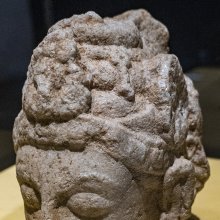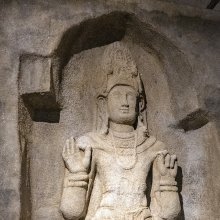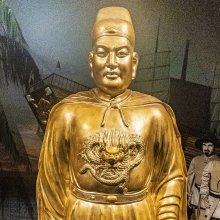Sea-voyage, Sea-journey: 1 definition
Introduction:
Sea-voyage means something in the history of ancient India. If you want to know the exact meaning, history, etymology or English translation of this term then check out the descriptions on this page. Add your comment or reference to a book if you want to contribute to this summary article.
Images (photo gallery)
India history and geography
Source: Singhi Jain Series: Ratnaprabha-suri’s Kuvalayamala-katha (history)Sea-voyage in ancient India was vividly depicted in the Kathās (narrative poems) such as Uddyotanasūri in his 8th-century Kuvalayamālā (a Prakrit Campū, similar to Kāvya poetry).—The Kuvalayamala (779 A.D.) is full of cultural material which gains in value because of the firm date of its composition. [...] Sijjau-jattā is a Prākrit rendering of the Sanskrit siddha-yātrā that was applied to sea-journey including going and safe return. This had become a technical phrase in medieval literature.
Details of preparation for sea-voyage (jattā or yātrā) are given which include the following items relating to preparatory ritual and the equipment of the ship:
- arrangement of boats or ships;
- loading of merchandise;
- bringing together other sailors;
- calculation of the duration of the journey both outward and inward;
- fixation of the date and time of departure;
- observation of portends whether favourable or vice versa;
- making announcements about the journey;
- prayers to proper deities;
- feeding the Brahmins;
- paying respects to select persons;
- worshipping of deities;
- arrangement of sails;
- raising of the mast;
- fitting the furniture for sitting and sleeping;
- collecting loads of timber for plank and fuel; and
- filling the containers with fresh sweet water.

The history of India traces the identification of countries, villages, towns and other regions of India, as well as mythology, zoology, royal dynasties, rulers, tribes, local festivities and traditions and regional languages. Ancient India enjoyed religious freedom and encourages the path of Dharma, a concept common to Buddhism, Hinduism, and Jainism.
See also (Relevant definitions)
Full-text (+56): Samudrayatra, Samudrayana, Jalayatra, Yanayatra, Naukayana, Katalyattirai, Worshipping, Arrangement, Paying respect, Raising, Sweet water, Timber, Merchandise, Announcement, Prayer, Furniture, Container, Samyatre, Mast, Sailor.
Relevant text
Search found 23 books and stories containing Sea-voyage, Sea-journey; (plurals include: voyages, journeys). You can also click to the full overview containing English textual excerpts. Below are direct links for the most relevant articles:
Manusmriti with the Commentary of Medhatithi (by Ganganatha Jha)
Verse 8.157 < [Section XXVII - Limitation of Interest (kusīdavṛddhi)]
Verse 2.248 < [Section XXXI - Acquiring of Learning from the Lowest]
Verse 8.404 < [Section XLVIII - Laws relating to Civic Misdemeanours]
Rig Veda (translation and commentary) (by H. H. Wilson)
Rig Veda 7.89.4 < [Sukta 89]
Egypt Through The Stereoscope (by James Henry Breasted)
Position 71 - Queen Makere's Expedition To East Africa In The Sixteenth Century Before Christ —reliefs At Der El-bahri, Thebes < [Standpoints In Egypt]
Yoga Vasistha [English], Volume 1-4 (by Vihari-Lala Mitra)
Chapter CXXII - The king's survey of the sea, and his locomotion on it < [Book VII - Nirvana prakarana part 2 (nirvana prakarana)]
Chapter XXXIV - Sermon of siva on the same subject < [Book VI - Nirvana prakarana part 1 (nirvana prakarana)]
Bihar and Eastern Uttar Pradesh (early history) (by Prakash Narayan)
Iron, Surplus, Production Trade and Urbanization < [Chapter 2 - Economic and Urban Processes]
Annadatri-carita (study) (by Sarannya V.)





